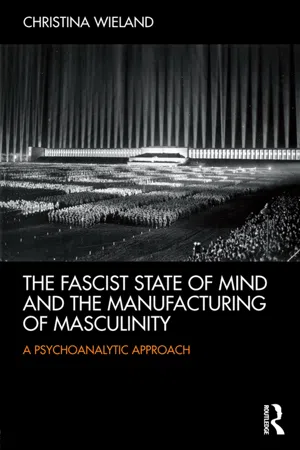
The Fascist State of Mind and the Manufacturing of Masculinity
A psychoanalytic approach
- 180 pages
- English
- ePUB (mobile friendly)
- Available on iOS & Android
The Fascist State of Mind and the Manufacturing of Masculinity
A psychoanalytic approach
About This Book
The Fascist State of Mind and the Manufacturing of Masculinity: A psychoanalytic approach attempts to describe in psychoanalytic terms the psychological consequences of massive social trauma and national humiliation, and the regression that takes place within the individual under these circumstances. The book is not about understanding fascism as a historical, political or sociological phenomenon, but about understanding the special relationship between masculinity and fascism and the state of mind which both shaped, and was shaped by, the historical phenomenon of fascism.
Christina Wieland explores fascism as a product of certain forms of masculinity and focuses on the dynamics of masculinity as a mode of psychic functioning. She examines in detail masculine anxieties and defences and their interaction with stresses of modernity and with the social and political unrest that followed World War One.
The Fascist State of Mind and the Manufacturing of Masculinity is divided into four parts:
Part One – The meaning of fascism and the fascist state of mind – theories and definitions
Part Two – Masculinity, its meaning and its vulnerability
Part Three – Group and group theory, and the total environment
Part Four – Exploring the links between masculinity, groups and fascism
The Fascist State of Mind and the Manufacturing of Masculinity uses clinical material, literary texts, and extensive psychoanalytic interpretation of some passages from Mein Kampf to illustrate the interplay of the psychological processes with social and political events. This book will appeal to psychoanalysts and psychoanalytic psychotherapists, teachers and students of psychoanalysis and gender studies. It will also appeal to those interested in the application of psychoanalytic insights in the understanding of social and political phenomena.
Frequently asked questions
Information
The Fascist State of Mind and the Manufacturing of Masculinity
The Fascist State of Mind and the Manufacturing of Masculinity

Contents
- Acknowledgements
- Introduction
- PART I The fascist state of mind
- 1 What is the fascist state of mind?
- Views of historians and social scientists
- Totalitarianism
- Hannah Arendt’s theory of totalitarianism
- The fascist state of mind: early psychoanalytic views
- The fascist state of mind: contemporary views
- Janine Chasseguet-Smirgel’s theory of utopia and totalitarianism
- Fascism as a group phenomenon
- Conclusion
- Notes
- 1 What is the fascist state of mind?
- PART II Masculinity and its discontents
- 2 Masculinity and violence
- The masculine dilemma
- Oedipus and the Sphinx: masculinity and the retreat from the Oedipus complex
- Clinical example
- Discussion ...
- 2 Masculinity and violence
Table of contents
- Cover Page
- Frontmatter 1
- Half Title Page
- Title Page
- Copyright Page
- Dedication
- Table of Contents
- Acknowledgements
- Introduction
- PART I The fascist state of mind
- PART II Masculinity and its discontents
- PART III Groups, fascism and masculinity
- PART IV Masculinity and fascism
- References
- Index